The month of Ava dedicated to water kicks off in the Parsi Shahanshahi calendar tomorrow, and with it comes the fragrant anticipation of tea time turning exciting with the addition of dar ni pori
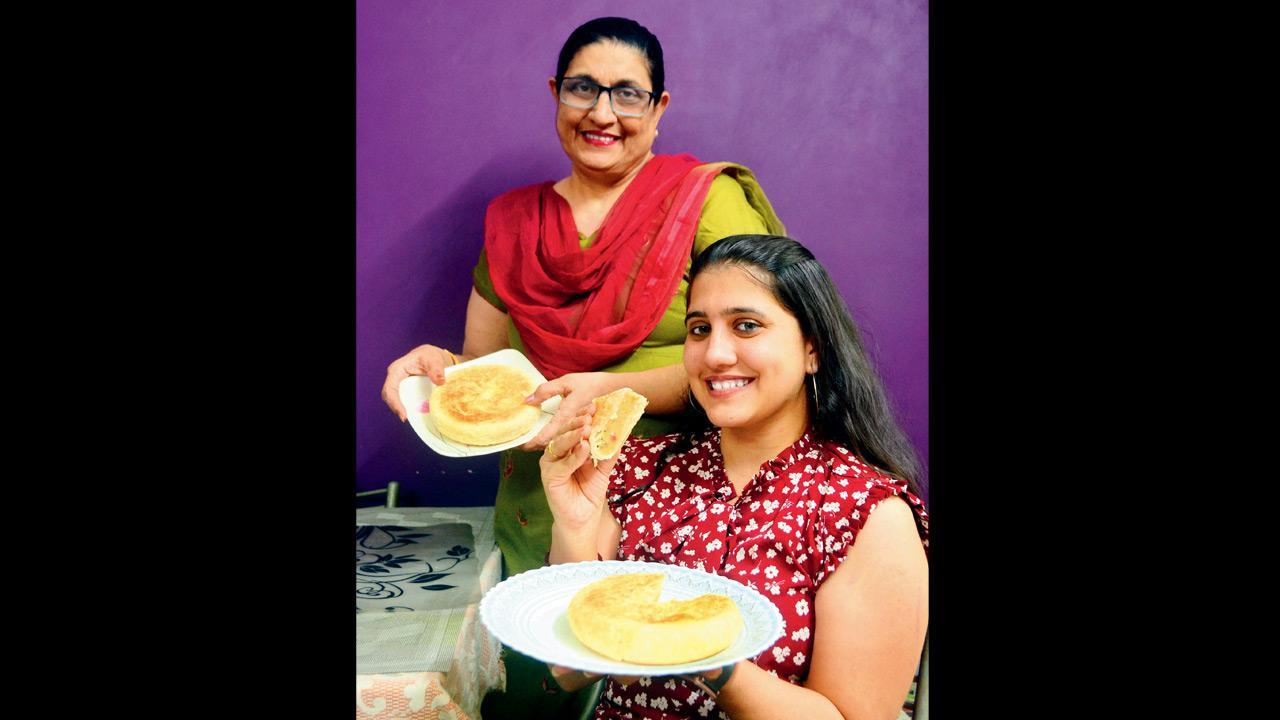
Bhoanita Wadia and her mother Parvin residents of Jogeshwari, make the dar ni pori on order. They launched their home-catering business during the lockdown. In the month of Ava, they get close to 200 orders. Pic/Sameer Markande
Delhi’s Parsis head to the Yamuna. In Mumbai, it’s Apollo Bunder, Dadar and Girgaum Chowpatty. On one day every year (March 14 this year), Parsi Zoroastrians in India pay their respects to water to celebrate Ava mahino (month) and Ava roj (day). They consider water as one of the key elements of the universe to preserve, with Ava Yazata, the guardian angel lending them a hand. At the core of the faith sits respect and protection of natural elements. This reverence to water is also starkly evident in the myth of Pir-e-Chak Chak, dating back to Sassanian times. The mountain shrine (pir) in Chak Chak near the city of Ardakan in Iran, is a pilgrimage spot. It’s here that Sassanian ruler Yazdegard III’s daughter Nikbanou was ambushed by Arab invaders. She prayed to Ahura Mazda, Zoroastrianism’s creator deity, and the mountain opened up, sheltering her in its orifice. Mountain Chak Chak (named after the constant sound of water hitting stone) has a perennial spring which legend says was fed from the tears of the mountain in Nikbanou’s remembrance.
ADVERTISEMENT
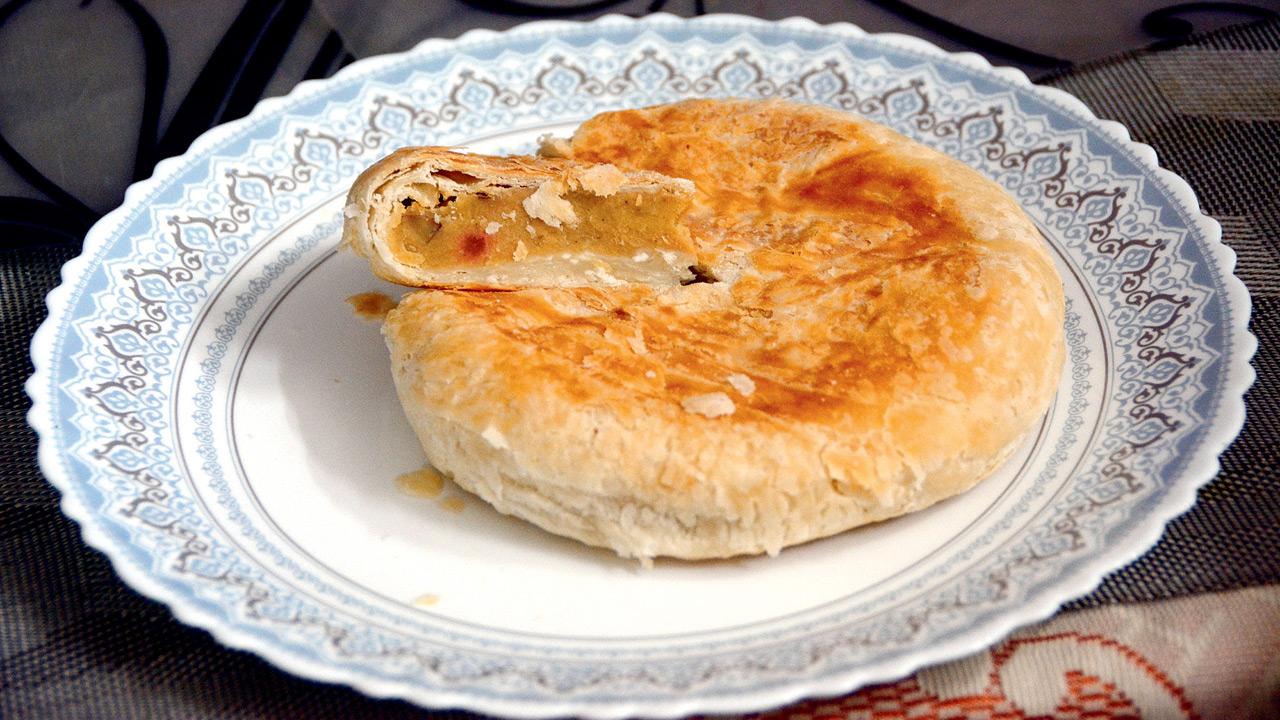
Bohanita Wadia, a resident of Jogeshwari’s Parsi settlement Malcolm Baug, says, “On this day, Zoroastrians offer flowers, sweets and coconut to the water. A ses [ritual silver tray] with a small divo [light] is placed near a river, the sea or well, decorated with flowers and chauk or rangoli patterns in calcium carbonate powder, particularly using the fish motif.”
Back home, Parsis celebrate the occasion with a unique tea-time sweet treat, the dar ni pori. Laborious to make, the round flat pastry is stuffed with sweet lentil filling, along with dried fruits like almond, cashew and raisins. Traditionally made on an iron griddle (tavo), the pori is now often made in an oven, and butter substitutes the ghee. Modern versions use a drop of vanilla essence instead of mild fragrant rosewater. But our hearts are still with the traditional preparation.
While the pori is made with simple staples found in every Parsi home pantry, the skills to prepare it must be mastered. Entirely handmade, it cooks over a flow flame and takes patience. Wadia, who makes them at her residence on order, and sells them at Rs 160 a pop, says, “During Avan nu parab, we make a batch of almost 200 poris. It’s a recipe I learned from my mother-in-law and fuiji [father-in-law’s sister]. He loved having it on weekends. The ladies of the household would enjoy chatting while preparing the pori over hours.”
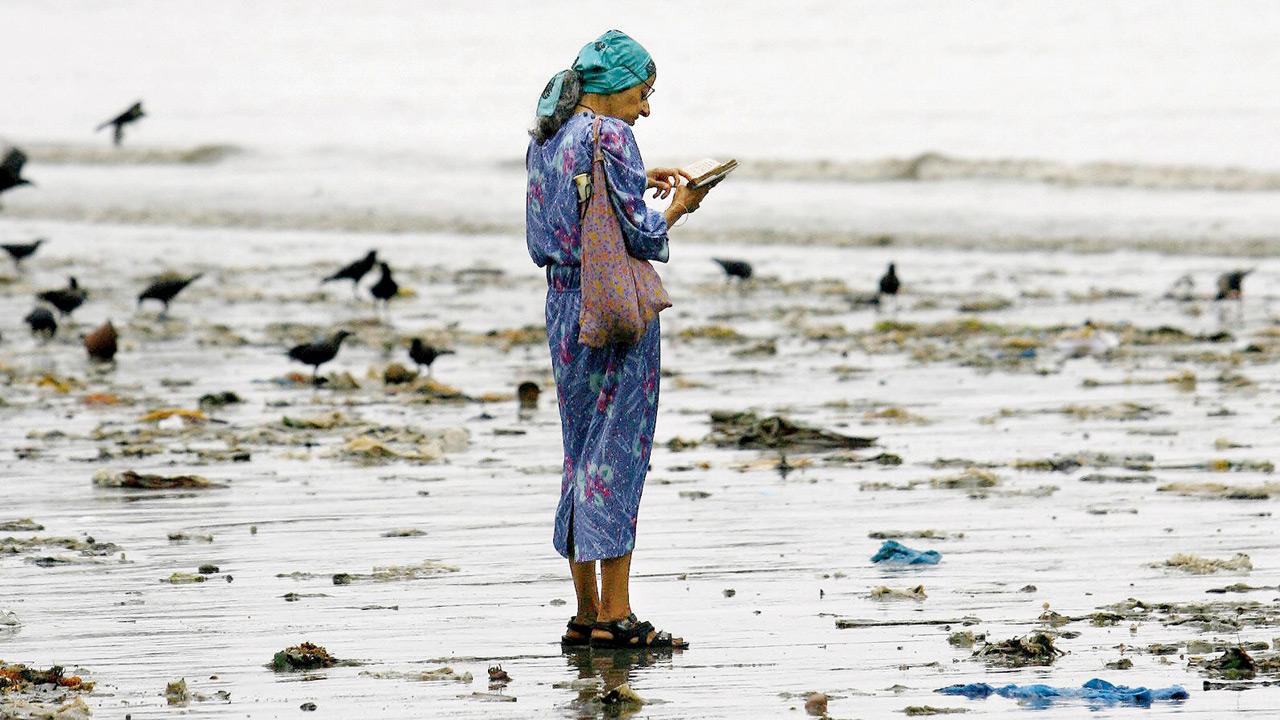
A file photo of a Parsi woman offering prayers to the water at Girgaum Chowpatty. Zoroastrians flock to water bodies on Avan mahino (month) Avan roj (day) every year to pay their respect. Pic/Getty Images
Wadia began to commercially supply the pori through her mother’s food catering venture, Parvin Rustomjee Paradise Eateries. This, like so many home chef enterprises, was born during the Coronavirus pandemic induced lockdown. Made in small batches with love and care, Wadia is happy to accommodate little requests, like chopping the dried fruits finer to allow for seniors to enjoy the pori with ease. They also make mava ni pori, Parsi sev, ravo and bhakras on auspicious occasions.
Cusrow Baug’s Furrokh Ragina has been a home chef making the dar ni pori (Rs 700) since he was in college to earn extra pocket money. “It’s my mum’s friend Parin aunty’s recipe,” he says. Old and frail, she was keen to pass on the recipe and asked if Ragina wished to learn. “I jumped at the offer. She shared the exact proportions with me, key to a successful attempt at pori making. I’ve stuck to it ever since.”
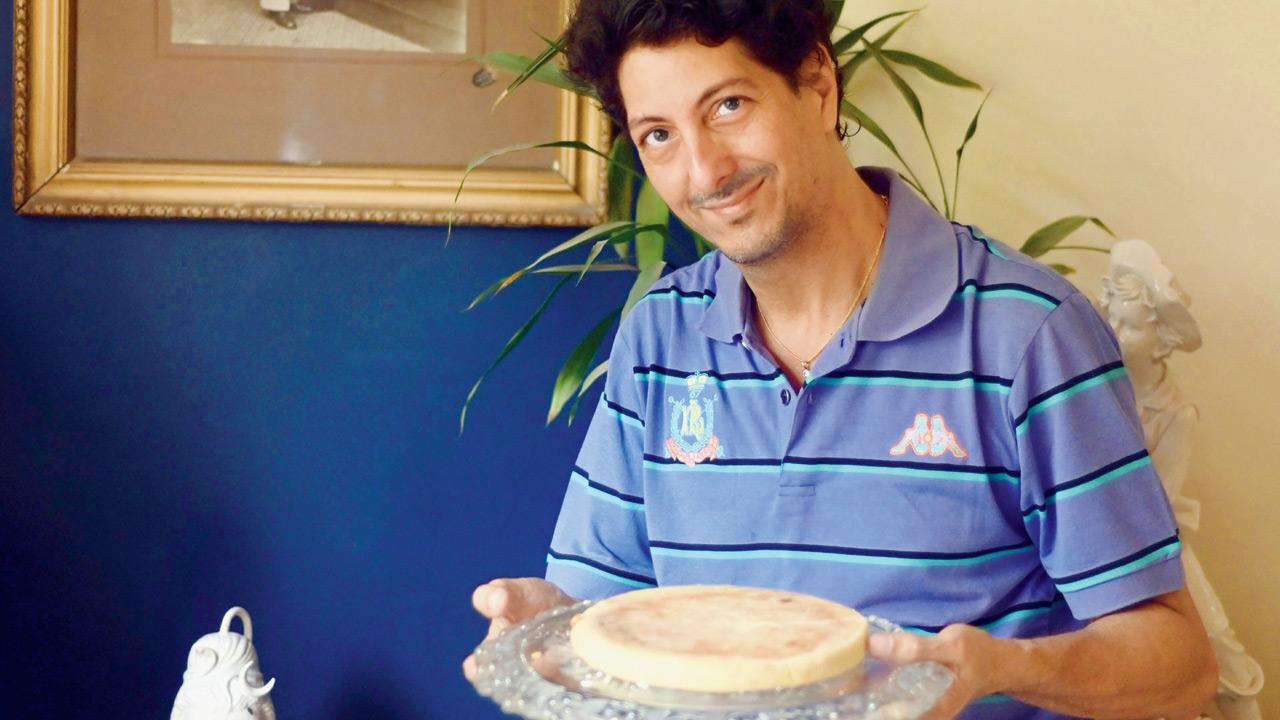
Furrokh Ragina of Colaba’s Cusrow Baug says he has been making poris, a recipe shared by his mother’s friend, since he was in college to earn extra pocket money. Pic/Bipin Kokate
Ragina’s first big order was for a wedding ceremony. “It’s a ritual to serve it after the engagement ceremony. The bride’s side brings seven [auspicious number] dar ni pori to the groom’s residence. I made sure that all the poris were baked right to turn out the same colour of golden, and that none of them cracked. Packed in boxes, my poris have travelled the world,” says Ragina, who in the Ava month alone, makes about 70 pieces. “I can’t take on more since I make them all single-handedly.” Unlike the usual six-incher, Ragina’s pori is king size at 10 inches.
Once, on the request of a 93-year-old Parsi resident in London, Ragina added khadi sakar (rock sugar) instead of processed sugar to the pori. “At first, I was hesitant to make changes to the original recipe but her confidence made me attempt it, and it changed everything. The sweetness was something else,” he remembers.
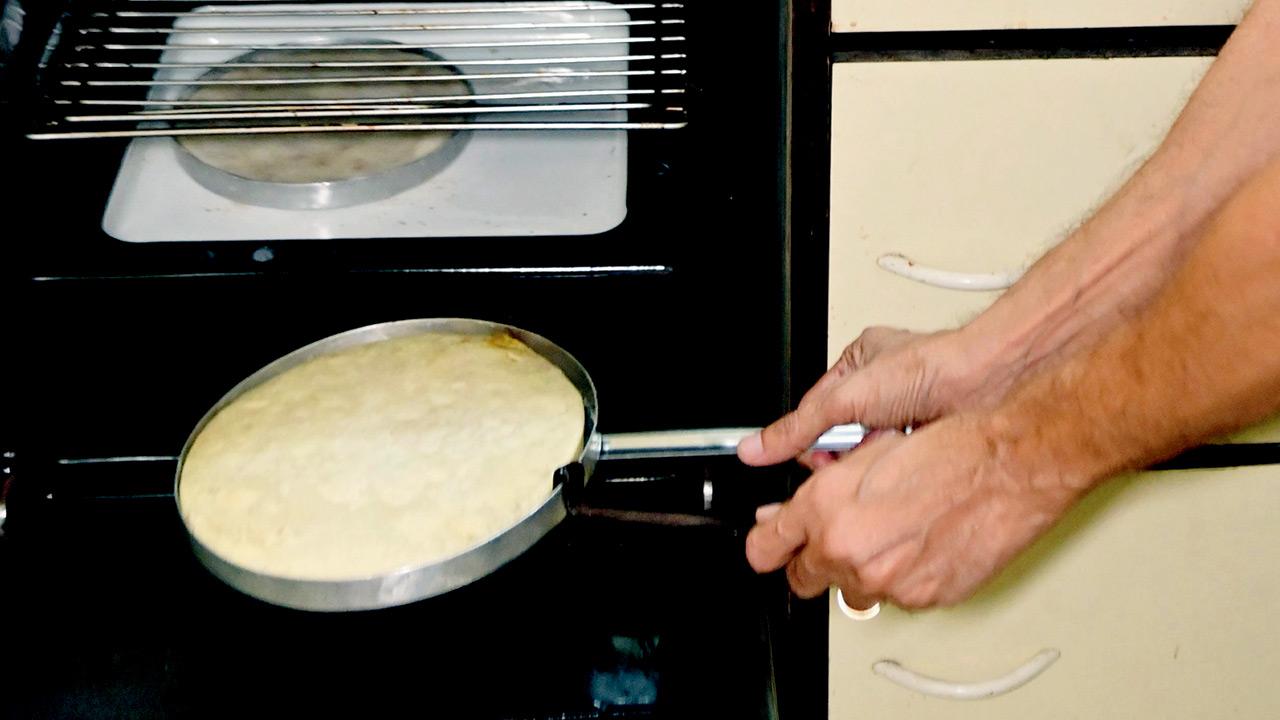
The home chefs say that back in the day, with no refrigeration available, preserving cooked lentils, fruits and nuts within a hollow flour casing was rather clever; perhaps to be carried along on long journeys. Some say the origins lie in Levantine cuisine where puff pastry is celebrated; others say it’s a combination of halvo [of Persian ancestry) and puran [of the Indian west coast lineage also used in puran poli]. Some even believe that the circular shape of the pori represents the earth, while the hard and soft outer and inner shells represent the outer (physical) and inner (spiritual) worlds we inhabit. Enough of talk. We suggest you order a pori and tuck in the way Parsis do, eating a fresh, warm slice with a cup of choi (tea with lemongrass, fresh mint, milk, and sugar) over endless banter.
To Order
Furrokh Ragina
9324636957
Bhoanita Wadia and Parvin Rustomjee
7738566930
All-time hit pori sellers
Sir Ratan Tata Institute (RTI), Hughes Road
Established in 1928 by Navajibai Tata and named after her husband Ratan Tata, RTI’s core kitchen team housed at this close to 100-year-old address, ships out Parsi grub to branches across the city, and set tiffin lunches to homes. Their mutton cutlets are delicious, as are the tea time sweets, including the dar ni pori
and khajur ni ghari (dates stuffed pastry).
Dal ni Pori for: Rs 135 per piece
Belgaum Ghee Depot, Nana Chowk
Started in 1943, selling ghee from Belgaum was the original family business but they’ve expanded to selling delicious Parsi treats, from smaller snacks like mutton samosas to more substantial dishes like greasy chicken farcha and of course, dar ni pori.
Rs 110 per piece
Parsi Amelioration Committee (PAC), Nana Chowk
Run by the Parsi Amelioration Committee, better known as the PAC, a charitable trust that works with the needy, this tiny place known for parsi food, snacks and pickles. Extremely reasonable – a meal for two would probably set you back Rs 250 – and with plenty of choice. Indulge in their dar ni pori or stop for a quick bite between errands.
Rs 125 per piece
Kerawalla and Co., Dhobi Talao
From back in 1887, Kerawalla has been a one-stop shop for Parsis, famous for their beautifully-designed sapaats (traditional leather or velvet slip ons) and topis, agarbattis, silverware, etc. Now, they also stock patrel, dar ni pori, khaman na laddoo, masalas, packets of Kolah’s pickles, and cakes and pastries from its pure veg patisserie.
Rs 80 per piece
Dadar Parsi Youths Assembly Snacks Centre (Perviz Hall), Dadar
Tucked away within Dadar Parsi Colony, the shelves here are brimming with sweet and savoury treats. From chicken and mutton cutlets to chapat and the dar ni pori, most of the dishes here are prepared at home by Parsi aunties and sold at the centre at reasonable prices.
Rs 150 per piece
 Subscribe today by clicking the link and stay updated with the latest news!" Click here!
Subscribe today by clicking the link and stay updated with the latest news!" Click here!







